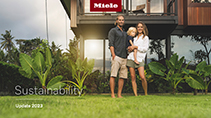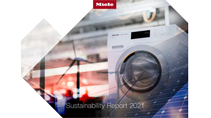Press releases
Sustainability on all levels – Miele consistently reduces the consumption of resources and CO2 emissions

-
Affirmation of climate protection
-
High standards in product development and production
-
Products and features allow customers to live a sustainable life
The battle to curb climate change is possibly the biggest global challenge of our day and age. It is the responsibility of each individual to contribute towards saving the planet. 'Saving our home on Earth is a battle against the clock', stresses Dr. Markus Miele, Executive Director and Co-Proprietor of the eponymous domestic appliance manufacturer, at their IFA press conference. Since the company was set up, great attention has always been attached to sustainability in all its facets, starting with the proverbial quality and durability of Miele appliances through to Miele's stand at the exhibition which also subscribes to sustainability criteria.
To further promote commitment to the principles of sustainability, the company has formulated pledges covering three key fields of action. 'In doing so, we face up to our entrepreneurial responsibility and aim at the same time to support our customers in acting more responsibly in the way they consume and to live more sustainably’, says Markus Miele. The pledges are:
1. 'Make sustainability happen at every step': Miele continuously works towards making sustainability essential at every stage of the services and the products’ life cycle – as well as in all of the value chains and in the home of the customers.
It is well known that the biggest impact of domestic appliances on the environment occurs during the usage phase – in particular with respect to electricity and water consumption. Consequently, Miele has for decades made great effort to minimise this impact, and not without success: The electricity consumption of Miele domestic appliances has dropped on average by 55% over the past 20 years. On washing machines, the reduction is just under 72%. The comparison is based on the most energy-efficient Miele models from 2000 and 2020 respectively based on the energy label. Opting for a washing machine from Miele, for instance, represents a personal contribution towards protecting the environment and the climate. Even in the Eco programme, cycle times are not overly long, the quality of results is high, and even small loads can be washed energy-efficiently with PowerWash technology and the SingleWash programme which is designed for washing individual garments. This saves resources and, at the end of the day, puts less strain on family finances – a veritable boon in the face of current energy prices.
With the aim of reducing CO2 emissions during the usage phase (so-called Scope 3 emissions according to the recognised criteria of the Greenhouse Gas Protocol) by a further 15% by 2030 compared with 2019, Miele has set itself a very ambitious target. The high-quality insulation technology presented on the new K 4000 refrigerator generation at IFA which sports an A rating for energy efficiency is one of many innovative steps towards achieving this goal. The same applies to the new Consumption Dashboard* in the Miele App, which offers full transparency regarding energy consumption on washing machines and dishwashers. This provides customers with sound tips on how to use their appliances even more sustainably and efficiently. Furthermore, Miele uses economical and efficient heat pumps on all its tumble dryers.
2. ‘Make appliances that won’t leave a mark’: Miele is dedicated to producing the best possible products and services with the least impact on the environment, with the ultimate aim to make them 100% carbon-neutral.
Even today, Miele is CO2-neutral across all its locations. This has been achieved for example by exclusively sourcing green electricity and compensating for remaining emissions with high-quality CO2 certificates. Miele has set itself the target of reducing absolute emissions at all its production plants and sales locations worldwide including the vehicle fleet by 50% by 2030 in comparison with 2019. This goal has been acknowledged and validated by the world-renowned Science Based Targets Initiative (SBTi) as being based on science.
To save further energy, the company will continue to invest in energy efficiency at its various locations as well as to expand its own power generation from renewable sources. Locations in China, Germany, the Netherlands and Austria already have PV systems or are in the process of setting such systems up. In April 2021, a PV installation at Miele's Chinese plant in Dongguan covering an area of just under 8150 m² went online, covering around one third of the plant's electricity requirements. This measure alone cuts CO2 emissions by more than 1600 tonnes each year. Shortly, the further expansion of PV arrays will be complete, almost tripling output and resulting in more electricity being generated than the plant requires.
3. ‘End waste by giving our appliances new life’: The third promise is to work towards creating a circular value chain with net zero waste for all materials used in the appliances to re-enter the loop at the end of their lifecycle.
Hardly any other manufacturer of domestic appliances is likely to be in such a strong position as Miele. This begins with the excellent recyclability of Miele appliances thanks to a metal content of as much as 80%, even up to 90% on commercial products, right through to plastics which can be perfectly sorted, and a circular economy in production. At the same time, Miele is working intensively on continuously increasing the proportion of recycled materials in its products and their packaging. These are further important steps on the road to a far-reaching circular economy. Amongst other issues, Miele is pursuing the objective of increasing the quantity of recycled plastics used to 7500 tonnes by 2025.
With the holistic approach embodied in these three pledges, Miele is showing once more that, as a family-owned company, it thinks in terms of generations and has its sights firmly fixed on the future. Sustainability was the corporate principle from the word 'go' – even if the term itself was not in use back in those days. The founding fathers aimed to build reliable, high-quality appliances, using choice materials and integrating innovative technical solutions. They were intended to last longer than their competitors' products and offer significantly more convenience. That was back in 1899, but today the very same principles are more important than ever before in view of climate change and the scarcity of resources. Studies have confirmed just how long-lasting Miele appliances contribute towards saving the planet: One analysis by the renowned Öko-Institut arrived at the conclusion several years ago that it makes both ecological and economic sense to operate highly efficient appliances for as long as possible. This endorses Miele's philosophy as the only manufacturer to test its domestic appliances to last up to 20 years.
Alongside sustainable products, Miele has also implemented the social components of sustainable corporate governance: The company has always taken responsibility for its employees, for example by offering a large number of voluntary social benefits, through healthcare programmes and by promoting diversity within the company - starting with setting up its own health insurance scheme in 1909 and by laying the foundations for a company pension fund some 20 years later. Miele is the only company to date in the domestic appliance industry in Europe to be certified according to the SA8000 international social standard and is viewed as an appreciative employer and fair business partner.
*Consumption Dashboard is an additional digital service from Miele & Cie. KG. All smart applications are enabled by the Miele@home system. The range of functions may vary depending on the model and the country.
Company profile: Miele is the world's leading manufacturer of premium domestic appliances including cooking, baking and steam-cooking appliances, refrigeration products, coffee makers, dishwashers and laundry and floor care products. Their product portfolio also includes dishwashers, air purifiers, washing machines and tumble dryers for commercial use as well as washer-disinfectors and sterilisers for use in medical and laboratory applications. Founded in 1899, the company has eight production plants in Germany, one each in Austria, the Czech Republic, China, Romania and Poland as well as two production plants belonging to its Italian medical technology subsidiary Steelco. Sales in the 2021 business year amounted to around € 4.84 bn. Miele is represented with its own sales subsidiaries and via importers in almost 100 countries/regions. Throughout the world, the family-run enterprise, now in its fourth generation, employs a workforce of around 22,300, of which approx. 11,200 employees work in Germany. The company has its headquarters in Gütersloh in Westphalia.
Download as PDF Download incl. media (zip)
Ursula Wilms
+ 49 5241 89-1958
ursula.wilms@miele.com
Media information
| Description | Download |
|---|---|

For the production of its domestic appliances, Miele sources green electricity and is CO2-neutral across all its locations. (Photo: Miele) |
|
| High Resolution JPG | |

Digital applications such as the Miele App help to control domestic appliances and save energy. (Photo: Miele) |
|
| High Resolution JPG | |

For reasons of quality, metal has always accounted for the biggest share of materials in most Miele appliances. No other material can be recycled to the same degree – almost 100 %. (Photo: Miele) |
|
| High Resolution JPG |


